Neal Ludevig is a producer, curator, environmentalist, artist, and entrepreneur focused on challenging dominant systems in today’s world. Currently the CEO and founder of Moon31, a media agency whose work challenges dominant systems through the creation of experiences and visual content that examine their dominance. Through massive events, festivals, TV, Film, exhibitions, dinners, or conversations, Moon31 creates content and platforms that spark conversations and bring stakeholders from all sides together for introspection, and ultimately, action. Outside of Moon31, Neal helped launch Enlightened Snacks, a national CPG company. He also currently serves as the Executive Producer for the Revive Big Band’s next album, led by Lauryn Hill’s current Musical Director, is a Producer and Writer for the mini-series Insomnia, curates an ongoing jam session called The Astor Party, and hosts FED Sessions, a dinner series where thought leaders and invitees “make bread and break bread” together. Additionally, he is an Experience Board Member at Selina, and is a member of Oceanic Global’s NYC Hub. Read more about Neal’s entrepreneurial journey below.
What does “entrepreneurship” mean to you?
Neal Ludevig: Entrepreneurship is a belief system. It’s not based on how many companies a person has started, but rather a fundamental mindset that guides how a person operates.
I believe entrepreneurship is grounded in 3 basic elements: mindset, actions, and drive.
By mindset, I mean having a solution-oriented mindset rather than a problem-oriented one. A true entrepreneur is the forever optimist (perhaps to a fault), believing that there are solutions to everything; we just have to uncover them.
Actions is the next step to the solution mindset. Entrepreneurship encompasses the value that “Actions speak louder than words.” It’s about doing, initiating, and moving towards a resolution.
Lastly, for drive, it’s never stopping. A personal mantra of mine that captures this is, “Walls are there to be broken down and to weed out those that don’t want it bad enough.” Another favorite is “Persistence beats resistance”. There are many sayings, all of them boiling down to being relentless, adamant, and driven.
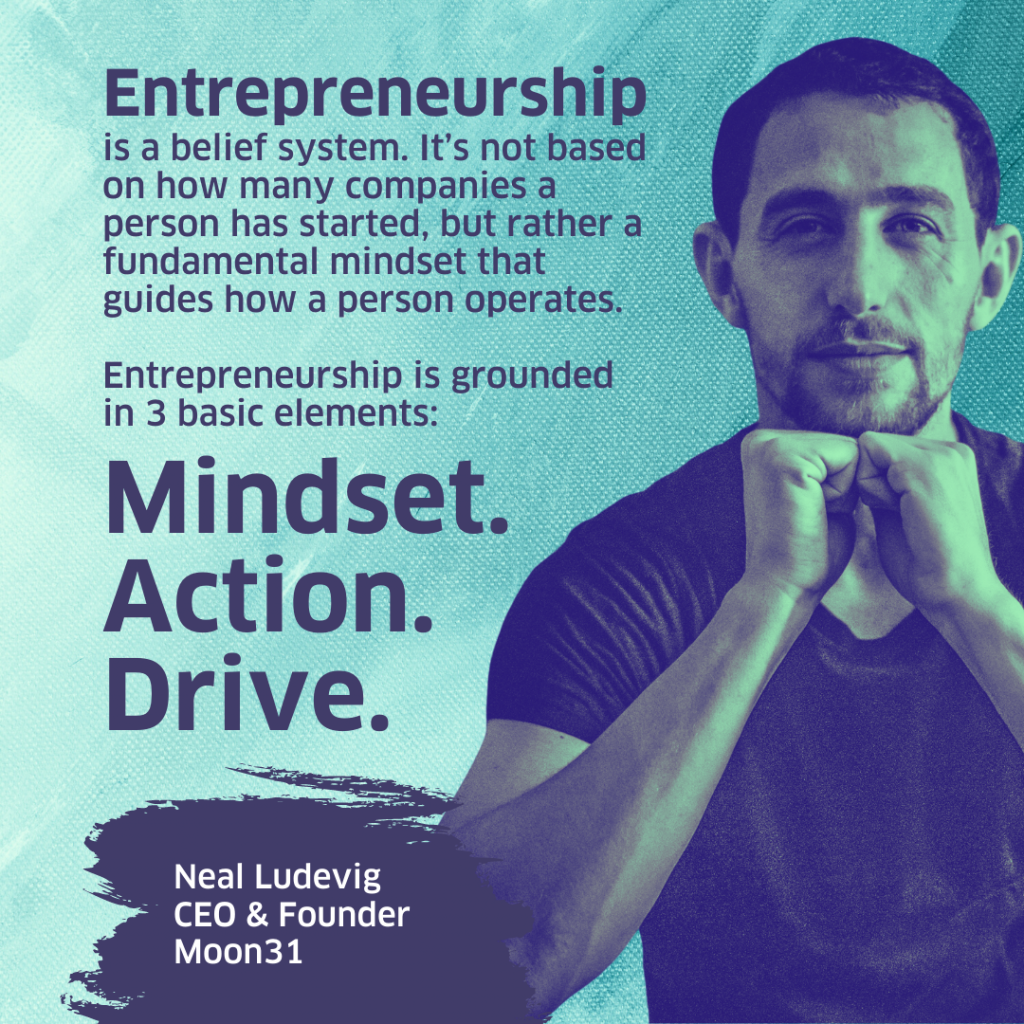 How did your company come to be?
How did your company come to be?
NL: I wish my “a-ha” moment came from a grandiose “Back to the Future” toilet-fall moment, but alas, it came from a midnight stroll on my birthday. Each year for my birthday I do a walk around midnight after a day of making no plans or commitments, just to clear my head and see what the universe may bring. On this day in 2017, I walked to the top of Marcus Garvey Park in Harlem. Sitting there, underneath a full moon, on my 31st birthday on March 1 (3/1), the dots connected. My mind was clear, the moon was full, and things suddenly felt possible. Moon31 was born.
But while the name emerged from a midnight stroll, what really made Moon31 real is its mission and values, which came from a longer journey. It was the result of wisdom from friends and mentors, alongside a combination of my experiences as an artist, as a booking agent and (tour) manager at AMI, my time at Enlightened Snacks, and my time building the non-profit Harlem Arts Festival (HAF).
All of these had their own values they pushed forward: AMI was committed to artistic innovation, fostering and nurturing culturally significant and forward-thinking artists. Enlightened maintained the importance of health (mind and body), believing that consumers deserved and wanted healthier options. And Harlem Arts Festival aimed to redefine artist support and community curation to serve and reflect the community it resided in.
Yet, despite sharing the values each of these companies had, there was still more I had to say, and I felt unfulfilled. Each of these organizations, while doing valuable and powerful work, felt limiting in a way that felt restricted to its own lane (food and nutrition only, for example), with its voice bound to its constituents (HAF was an organization that served artists and community members, not an environmental advocacy org).
What’s more, for all of these, my role was as an administrator, facilitator, and organizer. I had things I wanted to say, but somehow in my effort to support others and elevate artist’s voices, I had muted my own, As an artist and a creative motivated by all of these values and more (environmental sustainability, social justice, LGBT advocacy, and community building), I knew I needed to not just be a facilitator, but also be an active voice and decision maker in these conversations as well. So, forming a company where I had the freedom to choose any project that championed these values and made real impact was the dream.
It wasn’t until 2017 at the end of that year’s Harlem Arts Festival that I received some powerful wisdom from two incredible humans, mentors, and entrepreneurs – Dave Gise and Thuy-An Julien – that’s when my “a-ha” moment was achieved. Expressing frustrations at some of the initiatives I had wanted to do and the challenges I was facing in doing them at my current role, I asked if I should stay or try something else. Dave shared that trying to do work in any other sector than the one I truly wanted to do was bound to lead to unhappiness and dissatisfaction. “Do what you want to do, how you want to do it, and be known for it. Everything else will follow.” (I’m paraphrasing here). Thuy-an on the other hand, put it a bit more bluntly. “Cut the cord, move on and do what you want to do.” she said. Point taken.
Combined, this advice led me to a moment of realization that starting a space where I could choose what I wanted to do and how I wanted to do it, for the things I cared about, felt right.
How has your business changed in response to the COVID-19 pandemic?
NL: We’ve leaned hard into the world of content creation, as a result of other areas in the entertainment industry being put on hold. In partnership with 3 other investors, we’ve launched Snarky Elephant Productions, which has more than 20 works in development (including the acclaimed miniseries Insomnia), all of which are in discussions with a number of networks for its content. We’ve also been brought on to Executive Produce the Revive Big Band’s next album (led by Lauryn Hill’s current MD and former bandleader for Nas, Igmar Thomas) which is set to feature Cory Henry, Talib Kweli, Terrace Martin, among many others.
Perhaps most importantly, this has been a time to exercise the values core to our mission. We’ve been extremely active during the social justice and climate movements, coordinating and marching alongside protestors (namely The Blacksmiths and The Wide Awakes), and creating a Sustainable Protest Packet in partnership with Oceanic Global, a comprehensive guide for adopting sustainable practices before, during, and after protests with a focus on eliminating single-use plastics and implementing responsible waste management practices.
We’ve also been spending a lot of time connecting and supporting our network of artists that need support from the byproducts of COVID: mental health issues, depression, relapse, and more. As a result, we’ve also created a “Giving” section on our website dedicated to giving and supporting those in need each year.
What is your proudest and darkest moment so far?
NL: My proudest moment came from a nearly ten-year old dream coming to fruition. In 2010 whilst beginning Harlem Arts Festival, I discovered the hidden legacy of the Harlem Cultural Festival (aka Black Woodstock), an iconic event that took place in Harlem that practically nobody knew about. Its themes and messages were clear – brotherhood, love, empowerment, and activism, spearheaded by some of the greatest artists ever to take the stage: Stevie Wonder, Nina Simone, BB King, Sly and the Family Stone, Fifth Dimension, among many others.
Nine years later, I curated and produced (alongside Summerstage, Future x Sounds and Harlem Stage) A series of events celebrating the 50th year anniversary of Black Woodstockon. Taking place on Marcus Garvey’s birthday (August 17th) and the same days and location it originally happened, we brought artists and activists, from then and today, to perform and speak about the parallels between the past and the present. I was able to meet and work with heroes and inspirations of mine: Jamal Joseph, Talib Kweli, Juma Sultan, Keyon Harrold, Cory Henry, Igmar Thomas, Freddie Stone (yes, the Freddie Stone!)…the list goes on. Meeting and speaking about shared visions and ideas with them was something I’ll never forget. The event educated and brought to life a legacy that had almost been erased from history; we received global coverage from the New York Times, Rolling Stone, Time Out, and nearly every major media outlet due to what it represented and the never-before-seen photos we uncovered. To top it off, this event was the catalyst to working with and supporting the “Summer of Soul” documentary directed by Questlove, with Steve Jordan and the Jazz Foundation of America, and many others. I’ll never live down that high.
Perhaps an indicator that the saying, “What goes up, must come down” is truer than we realize, the darkest moment I can remember came not too long afterward. A close friend and inspiration of mine was hit hard by COVID. Trapped in another country at the onset of the pandemic, drug relapse, suicide attempts, mental health complications and a number of other issues nearly took their life. I’ve never felt so powerless in my life to help someone I so deeply cared about; I utilized every connection and resource available, called city officials and U.S. Embassy representatives, and worked around the clock (with a team of family and friends) to get them home safely. While they did get back in one piece, it left a powerful imprint on our relationship and my psyche. The experience was a stark wake-up call to the grim reality that exists in the artist world today: while music transcends emotions and benefits so many, musicians, artists, and creators are suffering heavily from mental health issues. Coming so shortly after curating a number of conversations around mental health, it reminded me that we all need to do more than just have the conversation. We need to make changes, enact policies, and act. There still aren’t enough resources for artists out there.
How is your company changing the landscape?
NL: The arts & entertainment space has a long way to go when it comes to equal representation, diversity, sustainability, and access. Both in the music world and in the TV/film space, there are serious issues when it comes to the makeup of the production and staff, the selection and curation process (of networks and presenting bodies), and the environmental impact of their actions.
For many of these places, amazingly, the conversation about these subjects haven’t even begun. This is where Moon31 comes in: we start conversations in these areas through television programs, festivals, dinners, exhibitions, panels, and more, with an intention to create a dialogue between stakeholders from all sides to gather for introspection, and ultimately, action. Everything we do directly challenges dominant systems through the creation of these experiences and visual content which examine their dominance.
Our activities focus on disruption by broadly raising awareness, assisting to invoke systemic change, and through strategic, targeted action. Our hope is that this work will plant the seeds needed to change the landscape in this industry and shift established standards, change company cultures, the entertainment industry, and larger global sensitivities, leading by example.
What do you wish you knew when you started? Is there anything you would do differently?
NL: I wish I would have stopped letting “the perfect be the enemy of the good”, and just put my messages and ideas out there. Often so caught up in connecting to other folks and whether I was the right voice to be articulating an opinion, I didn’t actually start speaking publicly (through a blog and through social media channels) about my thoughts until recently.
Connected to this, I wish I would have valued the written word a bit more rather than just the live experience. While the live experience is powerful, poignant, and irreplaceable, the digital age of COVID has illustrated that its impact is limited to the people that attend it. On the other hand, the written word (and other digital content) has the power to reach millions, to be easily shared across platforms, and to truly last. To put it another way, it’s sustainable and impactful. Had I written more, now more than 10 years later, I would have more to look back on.
If I could do anything differently, I would regularly write my ideas down publicly as a way to hold myself accountable to those values. Instead, I let insecurity step in and prevent me from putting out important messages that I thought weren’t mine to say.
A phrase that encompasses this truth is, “You don’t have to be great to start, but you do have to start to be great.”
What advice/credo do you live by as you grow the business / what is your professional and personal mission statement?
NL: I shared a Dalai Lama quote with a friend once, where he stated: “Man surprised me most about humanity. Because he sacrifices his health in order to make money. Then he sacrifices money to recuperate his health. And then he is so anxious about the future that he does not enjoy the present; the result being that he does not live in the present or the future; he lives as if he is never going to die, and then dies having never really lived.”
My friend responded; “The most dangerous bet one can make is to take the risk that they can make enough money now, to have the freedom to do what they want later.”
Boy, did that hit me like a ton of bricks. Since then it’s been a constant reminder of the importance of maintaining a healthy work/life balance. Without a sound mind, body, and spirit, we are nothing. We have to take care of ourselves and our world if we want to make a difference. As they say, “Health is wealth”.
Where do you find inspiration when faced with challenges?
NL: A bit figurative, but a technique I’ve been practicing is called “The Invisible Council,” that’s mentioned in the book, “Think and Grow Rich.” It’s a mental exercise where one envisions themselves in a conference room with those that most inspired them. It’s a chance to check-in with oneself while also getting some valuable perspective and answers, just by putting themselves in someone else’s shoes. I think it’s also particularly nice because it reinforces this idea that we all have the answers inside of us, we just have to take a moment to find them. It’s been a great tool when coming across a roadblock.
What does “success” look like for you? What do you think will help you achieve it?
NL: I’ll have found success if I can look around and know that the people I’m most inspired by, both personally and professionally, are my true family and friends. As long as that’s true and I’m doing what I love, with people that I love, while also supporting those that I love, that will be everything I need.
I believe that the more authentic I am to my voice, and the more I speak my truth publicly, the closer I will be to achieving this version of success.
Has personal or professional “success” changed for you since the COVID-19 pandemic?
NL: As a company, before the pandemic, success felt more quantitative and rooted in the numbers. “How big could an event be?” and “How many people could we attract?” These felt tangible, reliable, and impactful.
Since then, the definition of success has shifted. Qualitative metrics are taking precedence, answering questions like, “How does this feel?”, “What is our responsibility?” and “How can we improve?” putting everything we do under a lens of self-improvement.
I’d say that shift has found its way into a personal definition of success, where I’m becoming a bit more interested in how things feel, and what my gut says on it.
What’s it like to work alone or with your partners? What advice do you have for fellow entrepreneurs about building and leading teams?
NL: It’s amazing. All of the projects we do have teams, and having teams that operate seamlessly is such a magical thing. A great piece of advice given to me that’s helped me work with teams large and small is the 80/20 rule. There are many different versions of this, but the one I heard really hits the nail on the head when it comes to initiative, autonomy, and ownership.
The rule states that when leading and forming a team, 20% of everyone’s time should be spent on identifying problems, and 80% of the time should be spent on solving those problems. The only time anyone should be seeking help or assistance from another team member is after they’ve identified 3 potential solutions for that problem, and have two recommendations on what to choose from. That way the ask is about choosing the best option, not about doing the work for them.
I’d recommend that as a guiding philosophy for anyone building a team.
Many entrepreneurs continue to perfect their daily routines to support their work and greater vision; would you mind sharing your morning routine or a regular ritual that grounds your work each day? How has it changed in recent months?
NL: Sure! Relatively recently I did a 12-day Quepasana (it’s Vipassana combined with Yin Yoga and Wim Hoff). It was one of the most powerful experiences I’ve ever had, and I was very privileged to do it. While there, each morning as a group we did a morning meditation practice called “Shake, Rattle and Roll”, which I’ve continued to this day. You can see a guided version of it here, and it really gives a great jump start to the day! I usually do one more short sit of Transcendental Meditation at some point as a quick recharge, or just go outside if I have time, since I just think that’s so important. Both of these have had a big impact on just giving me a healthy recharge or start to the day.
Beyond that, I’m a big fan of having a morning smoothie after meditating with Ka’chava (I’m obsessed), avocado, apples, spinach, maca, mandarin, peanut butter, blueberries, bananas, some cinnamon, granola, and milk.
What keeps you motivated during this time?
NL: Truly, my friends. I’m very fortunate to be surrounded by some incredible people that challenge and question what I do, why I do it, and how I’m doing it. Wouldn’t get anywhere without them.
I also have to give recognition to my family. Everyone in it — my parents, grandparents, my brother…I’m quite lucky to have family members that set an example for me to push the envelope. My brother, for instance…what he’s done is just jaw-dropping. From being a professional dancer to becoming an architect, to running a private dance/yoga retreat center in Morocco, to now running a leadership company and launching “The Naked Bartender,” I’m constantly motivated just witnessing everything he does. He makes me feel lazy (but in a good way that’s inspiring).
And my parents are the same. Both came to America with nothing from their respective countries — Russia and Poland – as a result of persecution, and built careers and a family while maintaining a life. Even now, retired, my parents do everything from paint to play music (piano & guitar), play tennis and sports regularly, travel, take classes at nearby universities, and more. And here I thought retirement was supposed to be relaxing, ha! They set an example every day that the learning shouldn’t ever stop.
What kind of an entrepreneur do you want to be known as, as in, what do you want your legacy to be?
NL: As an artist and entrepreneur, to be able to look back and see that the work that I did made the world a better place for artists, musicians and entrepreneurs would be an incredible legacy. Having a world with more resources, stability, and support for my communities in this way would truly be something special.
I’d also love it if my journey inspired others to become entrepreneurs, encouraging them to take their lives into their own hands and choose their own work/life balance. Think of all of the incredible ideas we’d see come to fruition if entrepreneurship was normalized!
What is a quote or some words of wisdom that help get you through the tough days?
NL: One of my inspirations is the late Randy Pausch, an author and professor from Carnegie Mellon most known for “The Last Lecture” (worth watching!). The video is filled with valuable advice which helped me through the tough days that are often filled with criticism and barriers to entry everywhere.
I alluded to it earlier when speaking about my definition of entrepreneurship. When speaking about facing barriers, Pausch stated, “The brick walls are there for a reason. The brick walls are not there to keep us out. The brick walls are there to give us a chance to show how badly we want something. Because the brick walls are there to stop the people who don’t want it badly enough. They’re there to stop the other people.”
At another point, he shared words of wisdom about the value of your critics, stating, “When you’re screwing up and nobody’s saying anything to you anymore, that means they gave up… When you see yourself doing something badly and nobody’s bothering to tell you anymore, that’s a very bad place to be. Your critics are your ones telling you they still love you and care.”
So my advice would be to value your critics, remember that the challenges are there to make you better and that the constructive criticism you receive along the way is from those that believe you have the potential to overcome those challenges.
Have you experienced mentorship in your career? Do you feel it was easily available to you? Who are the people who have mentored or influenced you in your life or career? How has their influence changed the trajectory of your entrepreneurial journey?
NL: Absolutely! Wouldn’t be here without these superhumans. I’ve mentioned some of them already – Dave Gise, co-founder of the Centre for Social Innovation in NYC and music industry guru Thuy-an Julien (who, quite frankly, has done it all). Others that come to mind are acclaimed writer and activist Jamal Joseph; Curtis Archer (the unofficial mayor of Harlem), House of Yes owner Justin Ahiyon; Producer Meghan Stabile (of Revive Music); Future Meets Present founder Amer Jandali; programming badass Monique Martin; Wardrobe Founder Adarsh Alphons (not to mention Project Art Founder); creative ninja Angela Gil of the World Jam and Future x Sounds; the incomparable Guy Routte (he, too, has done it all); David Tao of Barbend and JAKK Media; career coach Elena Addomine of INSOL consulting; Erika Elliott of Summerstage… the list goes on!
For all of these folks, they’ve been ready and available to help. That said, it was only when I truly became vulnerable and asked for help did things really move forward, and our relationships grew. It took me a long time to learn that — that the best way to get support and mentorship is to reach out and ask! It’s the first step, but often the hardest.
All of those people have played a role in my journey, some more than they realize. They’ve provided counsel, direction, criticism, connections, and more which gave me the confidence to make decisions, make mistakes (sometimes big ones), and to come back from those to be even better.
The people that I’ve mentioned, without question, have guided and changed the direction of my career.
Do you have someone you’d like to nominate to be profiled in our Faces of Entrepreneurship series? Please let us know by emailing media@thecenter.nasdaq.org.
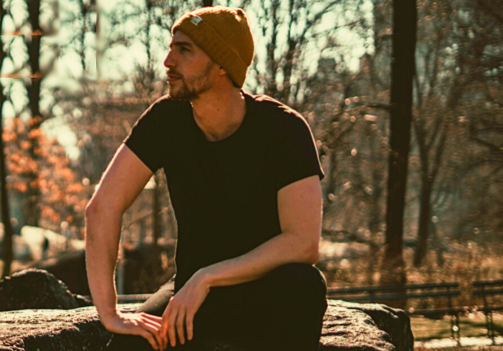
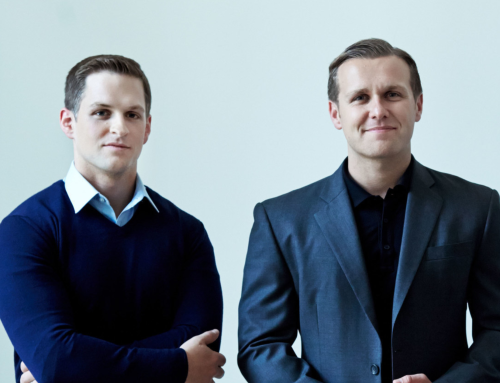
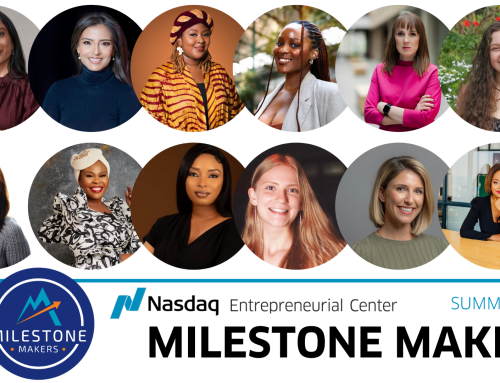
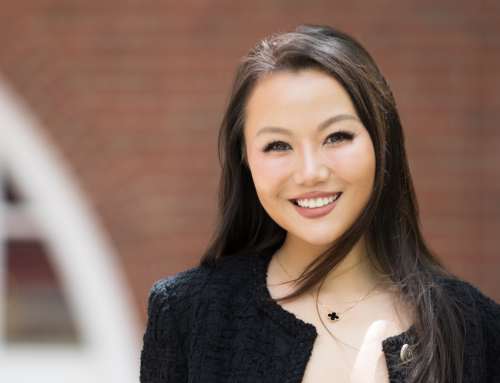
Invite a Friend
Close